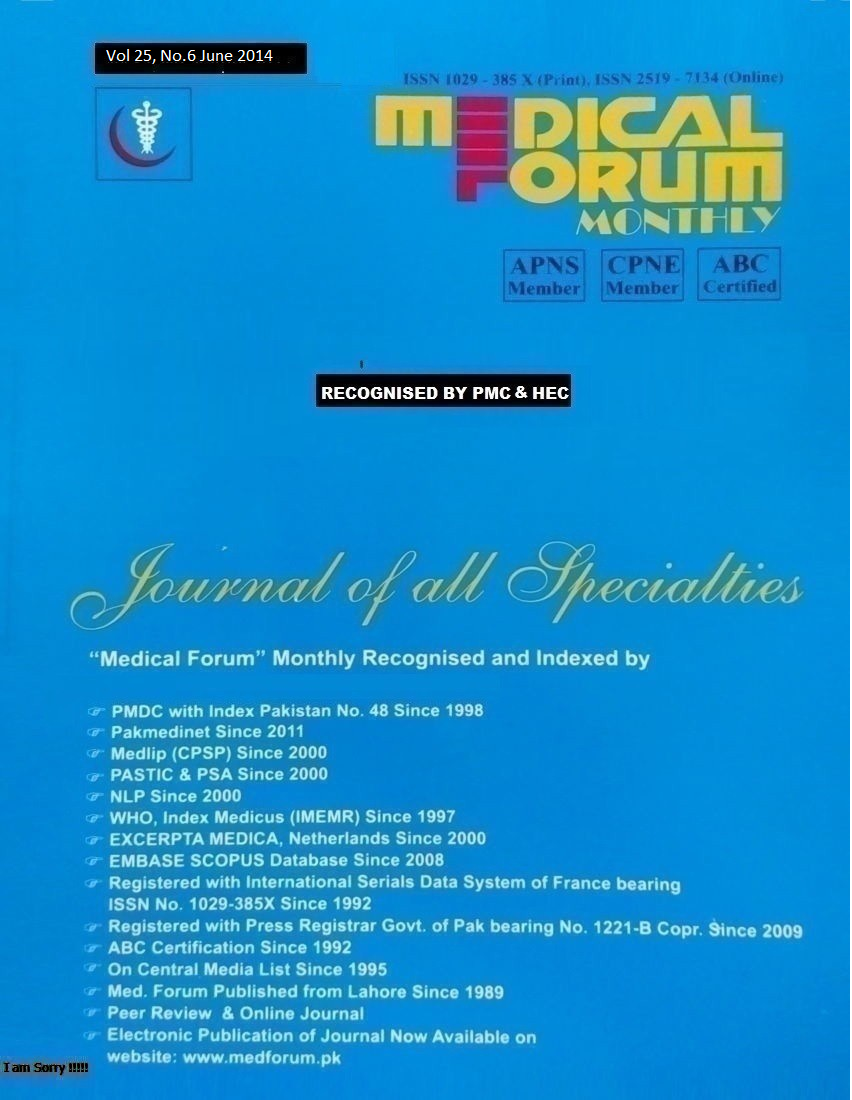
3. Response Rate of Standard Interferon Therapy in Chronic Hepatitis C
1. Javed Akhtar Rathore 2. Mohammed Saleem 3. Aamir Ghafoor Khan
1. Asstt. Prof. of Medicine AJK Medical College Muzaffaraabad 2.Consultant Physician DHQ Hospital Kotli
3.Prof. of Gastroenterology Lady Reading Hospital Peshawar
ABSTRACT
Objectives: Interferon combination therapy is used to eradicate the Hepatitis C Virus from infected individuals. HCV (hepatitis C virus) infections respond to standard conventional interferon (INF) therapy along with ribavirin (RBA).The aim of study was to look for response of chronic HCV infections to standard conventional combination interferon therapy and ribavirin.
Study Design: Interventional non randomized trial
Place and duration of Study: This study was carried out at Azad Kashmir Combined Military Hospital (AK CMH)/Sheik Khalifa Bin Zyad (SKBZ) Muzaffarabad (MZD) from June 2009 to July 2012.
 Materials and Method: A total of 210 patients were selected for interferon combination therapy. After confirmation of active HCV infection by PCR-RNA, conventional interferon alpha 2a with ribavirin (RBA) was given to patients for 6 months. After end of treatment (ETR), the efficacy was defined as sustained virological response (SVR) if HCV-RNA remained undetected 6 months after stoppage of combination interferon therapy. Results: Out of total 210 patients, 144 (68.6%) showed SVR and 66 (31.4%) did not show SVR. Hence out of 68.6 % were negative and 31.4% were positive for HCV RNA after 6 months of therapy. The non parametric chi squared showed age (p=<0.001), (age category p=<0.001), gender (p=<0.006), and HCV PCR response (p=<0.001) had statistical significant association.
Materials and Method: A total of 210 patients were selected for interferon combination therapy. After confirmation of active HCV infection by PCR-RNA, conventional interferon alpha 2a with ribavirin (RBA) was given to patients for 6 months. After end of treatment (ETR), the efficacy was defined as sustained virological response (SVR) if HCV-RNA remained undetected 6 months after stoppage of combination interferon therapy. Results: Out of total 210 patients, 144 (68.6%) showed SVR and 66 (31.4%) did not show SVR. Hence out of 68.6 % were negative and 31.4% were positive for HCV RNA after 6 months of therapy. The non parametric chi squared showed age (p=<0.001), (age category p=<0.001), gender (p=<0.006), and HCV PCR response (p=<0.001) had statistical significant association.
Conclusion: Conventional Interferon and ribavirin combination therapy (INF-RBA) remains effective in chronic hepatitis naïve patients. HCV-RNA qualitative PCR test at 6 month of ETR is important predictor of SVR. The response of antiviral therapy against HCV infection in chronic HCV patients is 68.6 %. The high response rate may be due to the prevalence of IFN-responsive HCV genotypes type 3 in our country.
Key Words: Sustained virological response; Conventional Interferon; Ribavirin; Chronic Hepatitis C
